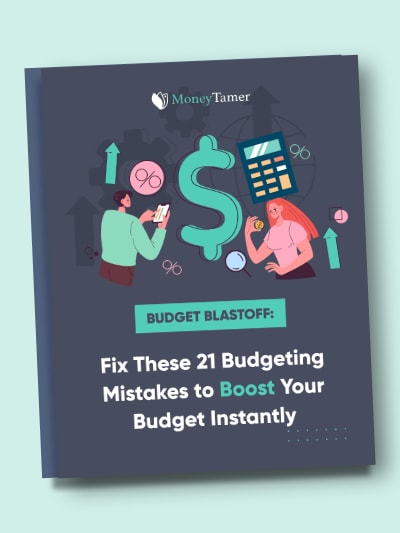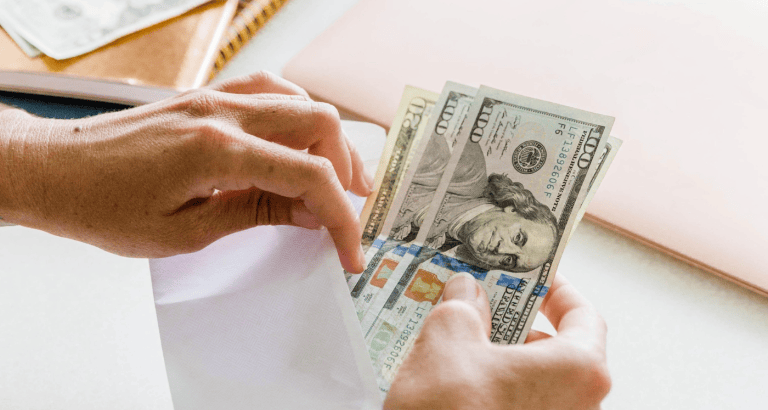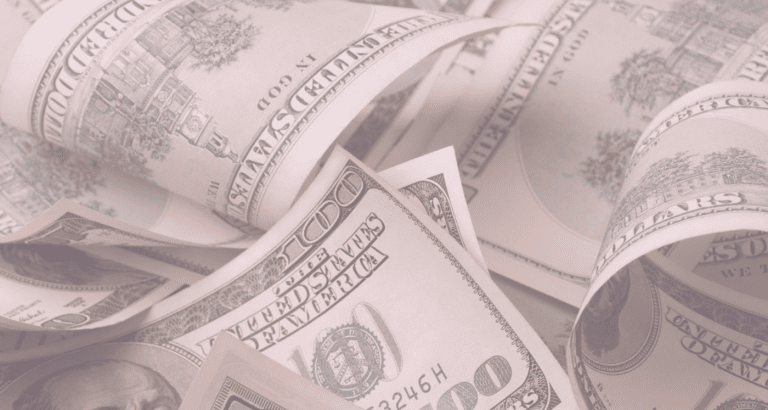How To Catch Up On Bills When You Fall Behind
It can happen to anyone. Maybe you find you’re spending more than you can afford. Perhaps you’ve had unexpected expenses come up. Suddenly you’re wondering how to catch up on bills when you fall behind.
While it can be a bit scary to realize things aren’t getting paid, as soon as you recognize it, you can begin to fix it.
This guide will show you how to catch up on bills when you fall behind and begin living life without money worries.
Immediate Actions to Take When You’re Behind on Bills
With bills overwhelming you, it may seem like ignoring them is the best idea. No matter how much you’d rather not think about the situation, unpaid accounts will get worse if left alone.
As an affiliate partner of various brands and sponsored content, HerPaperRoute may earn commission on qualifying purchases. Disclaimer | Advertise With Us
It’s good to get started immediately to take care of the problem. Here’s how.
Make a Written List of Your Bills
Listing out all your bills and the amounts you owe can be extremely helpful. Although most people think they know this information by heart, sometimes writing it out can help us with things we might be forgetting.
Grab a piece of paper, or use a spreadsheet, if you prefer, to begin. Write out each bill, when it’s due, who you owe it to, how much it costs per month, and how much is due total.
Don’t forget to add items that aren’t necessarily bills but still cost money, like groceries or gas for your car. You want to add detail so you’ll get a complete picture of your situation.
If it helps you, try coordinating your bills by color—for example, blue for home and rent costs, pink for groceries and restaurants, etc. Frame your list in a way that makes sense for you.
Prioritize Your Bills
After writing out your bills, analyze what you’ve written, determining what is the highest priority and what can wait. High priority is usually things you cannot do without – stuff like mortgage or rent, utilities, food, phone bills, insurance, and gas for your car.
A lower priority item might be paying off credit cards or bills that are not due immediately. These are things that don’t affect your everyday life as much.
You can then take your bills and list them in order of importance. Number them if this helps you. Now you know what needs to get paid for first.
Cut all Unnecessary Expenses
If you’re having trouble handling your living expenses, see where you can cut back. Spending less can happen in many ways, so try to be creative. Some everyday things that people overspend on include food, transportation, and impulse purchases.
You can avoid this by trying out new ways of living. Try to get into a frugal mindset. It doesn’t mean you never spend money, but rather, that you are conscious of what you spend and why.
Related: How to live without money. Yes, really!
Instead of buying lunch out, pack sandwiches from home. Ask yourself how you can save money: can you bike to work instead of spending cash on gas? What do you buy that you don’t need?
Also, see what you can get rid of without noticing. For example, streaming services, subscriptions to magazines, or whatever else comes to mind. It will help you to save some cash quickly.
Call Your Creditors to Set Up a Plan
While it may seem intimidating, it can benefit you to talk to your creditors. Explain to them that you are trying to pay them back, and give them some details about how you plan to do so.
Tell them what you can pay, and when. Ask them what they can offer to help you.
While you do want to communicate, it’s also important to be careful. Suppose your account gets sent to a debt collector. In that case, they have to abide by specific standards.
How Can I Get My Bills Under Control?
If you feel like your situation is overwhelming, you’re not alone. Many people find it difficult to pay their expenses. But I have some ideas to help you take control of your finances permanently. It helps to start some good habits that allow you to be the best you can be.
Set a Strict Budget
Yes, being disciplined is a huge part of getting back on track with money. You cannot make your payments without a plan. So, it’s time to create a budget. Many people don’t like this word, but it isn’t as difficult as you’d think.
What is a budget? It’s simply listing out your expenses and income and deciding how much money belongs in each category.
Some people follow a weekly budget, and others a monthly one. You can choose based on the dates you get paid.
Since you’ve already listed out your bills, reference that while you create your budget. Write them out in order of when they’re due. Make sure to add in all these categories:
- Mortgage or Rent
- Groceries
- Gas and car maintenance
- Phone Bill
- Internet
- Utilities
- Car payment
- Insurance
- Clothing
- Medical expenses
- Credit card debt or other debts
After you list your expenses, add them up for a total. Compare this to your income – if your income is more than your expenses, good news!
It means you are probably just overspending in less essential categories and need to cut back to get caught up.
If your income and costs are equal, that means you can pay your bills, but it’s going to be very tight. You’ll probably want to stop spending on anything unnecessary.
Suppose your expenses are more than your income. In that case, you’ll need to consider increasing your cash flow to make your payments, and also reducing your expenses.
You may also find ways to live on less money, such as moving to a less expensive area.

Are You Sabotaging Your Budget?
See the budgeting mistakes that are holding you back in this FREE Budgeting ebook. Fix these and your budget will blast off!
Increase Your Income
When your bills are eating away your whole paycheck, it’s hard to get ahead. Spending everything doesn’t leave you any money for emergencies, savings, or investing.
To fix this problem, you’ll need to increase your income.
There are several ways to do this. You can get a part-time job somewhere, working a few evenings a week. This is a good option for some people, but it depends on your lifestyle.
A part-time job should bring you the extra income you need to catch up on bills and stay ahead, but sometimes the hours can be challenging.
Related: How to make an extra $300 fast
Another idea is to take on a few odd jobs here and there. You might try cutting grass, cleaning houses, or something else. Odd jobs work out well if your schedule varies a lot and you aren’t too picky about the type of work.
Some people also prefer to work for themselves as freelancers. You can create a side hustle doing almost anything.
You might sell items online, become a blogger, or anything else you can come up with. Side hustles are things that many people enjoy doing, but it does require some extra work, so decide in advance if it’s right for you.
Should I Get a Personal Loan to Catch up on Bills?
While it can be tempting to get a personal loan, the reality is that when people do this, they’re just moving their debt from one place to another. Sure, you’ll get caught up with some creditors, but then you’ll have a new one you need to pay.
The best option is to organize your finances, make a plan, and pay back your bills yourself, without the help of a loan. It will stop you from creating a bigger problem long-term.
You can use the tips I’ve outlined in this article to help you regain control of your finances. But what about the future? Here’s what to do to make sure you stay ahead of the game.
Getting a Month Ahead on Bills
It’s a good idea to get a month ahead with your bills to give yourself some room to breathe. Or even two or three months, if you feel like this would be helpful.
That way, you no longer have to be concerned about not having the money to pay for the basics.
So how do you do it? First, refer to the total cost of your expenses from earlier.
Once you have that number in mind, you can begin to work towards it. Start setting aside any money you can save at the end of the month to get to that number.
You can do this by reducing your bill costs and saving the difference. To get this done even faster, you might also try increasing your income with one of the ideas listed above.
Once you save up your total cost of bills for a month, set it aside somewhere you can get to if you need it. That’s one of the ways to get ahead on your accounts.
You can also pay some bills a month ahead. If you’re concerned about having too much cash sitting in savings, you might pay your bills early.
You can pay mortgages, insurance, and some other expenses in advance. By doing this, you’re paying next month’s bills this month.
That means if it’s March, your bills are paid through April. Setting this up can help you remain calm about finances in the future.
Try a No Spend Month
No-spend months are a popular way to save money quickly. The concept is simple: you spend as little as possible for the whole month.
You cut back in every category you can and pay only what you need to for your bills. Spending on things like eating out, movies, and entertainment you’ll leave for another time.
It’s a great thing to try for a month (or two) if you are behind on bills. Plus, most people are familiar with the idea, so if someone invites you out and you tell them you’re doing a no-spend month, they will probably understand.
You can also try a no-spend for one specific thing. If you feel like you overspend on one category, such as restaurants, try going without for a month.
The chances are, you won’t miss it as much as you thought you would, and you’ll love the freedom of extra money!
Shop Around
While some things cost what they cost, no matter what, not all of your expenses are set in stone. What I mean is, you can look around to see if you can find a better deal.
Things like phone and internet service are a great place to begin. Look around for companies that offer a cheaper plan that will work for you, and see if you can switch over.
Make sure it doesn’t cost money to switch, though. Or, if it does, ask how much to figure out if you’ll be saving money long-term or not.
Another thing you might try is taking more control of your bills that frequently change. Electric and water bills may cost more or less depending on how much you use unless it’s a flat rate.
If you can, try saving water by only washing clothes on certain days. For electricity, you might try turning the air conditioner or heater up or down a degree or two to save money.
While it’s important that you still keep your home and life comfortable, you can often save money just by being more conscious of how much things cost. Cut back where you can, and be smart about how you use utilities.
Don’t Give Up
While this can seem like a lot, remember that you can do it! Don’t give up on catching up on your bills because it is entirely doable with a solid plan.
Keep researching, reading, and planning with money, as more knowledge can only help you financially. You can do this, and you will be successful when you don’t give up.
Related Articles:
- Easy Method for Keeping Track of Bills and Payments
- Effective Budgeting Strategies to Try
- Budgeting Your Bi-Weekly Paychecks
- Positive Reasons to Become a Cheapskate








![I Don't Want to Work [Essential Things to Do Before You Quit] 7 I Don’t Want to Work [Essential Things to Do Before You Quit]](https://herpaperroute.com/wp-content/uploads/2022/04/I-Dont-Want-to-Work-tips-before-you-leave-your-job-768x410.png)


![Your Life After Mortgage is Paid Off [What to do and What Changes] 10 Your Life After Mortgage is Paid Off [What to do and What Changes]](https://herpaperroute.com/wp-content/uploads/2021/11/Your-Life-After-Mortgage-is-Paid-Off-768x410.jpeg)
